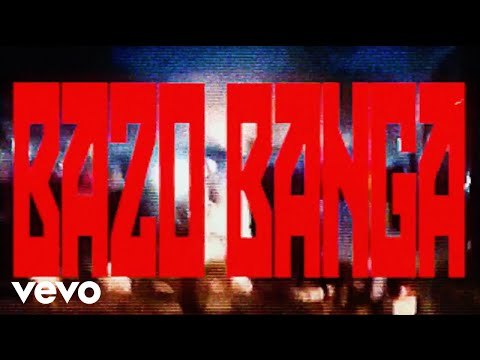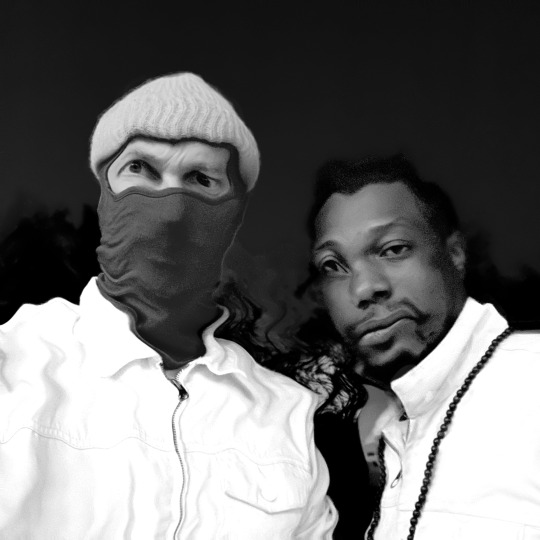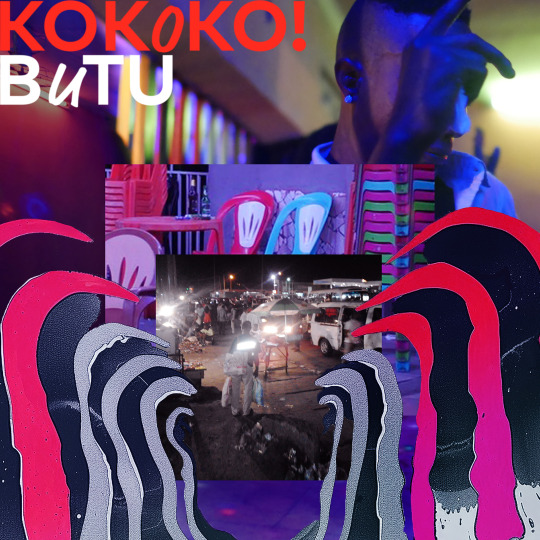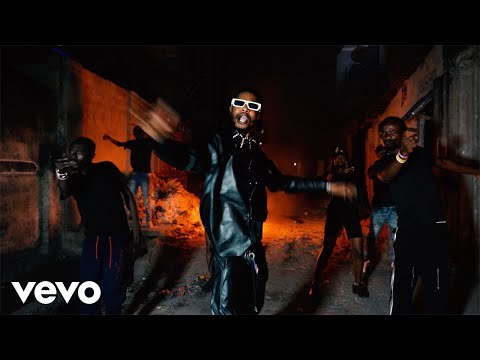#KOKOKO! BUTU
Text
New Video: KOKOKO! Shares Throbbing and Propulsive "Bazo Bango"
New Video: KOKOKO! Shares Throbbing and Propulsive "Bazo Bango" @KOKOKOmusic @transgressiveHQ @curlytt
The acclaimed Congolese collective KOKOKO!’s highly-anticipated sophomore album BUTU is slated for a July 5, 2024 release through Transgressive Records. BUTU sees the collective continuing to pair a defiantly resistant punk-like energy, informed and inspired by the attitude and thought of a new generation of Congolese artists and young people with their neck-snapping, attention-grabbing block…

View On WordPress
#African Diaspora Music#African music#afro pop#Bazo Bango#electro pop#indie electro pop#Kinshasa Democratic Republic of Congo#KOKOK#KOKOKO!#KOKOKO! BUTU#KOKOKO! Fongola#KOKOKO! Mokili#KOKOKO! Salaka Bien#music#music video#New Video#Transgressive Records#video#Video Review#Video Review: KOKOKO! Bazo Bango#world music
0 notes
Text
[Album + Video] KOKOKO! kündigen neues Album "BUTU" an!

KOKOKO! hat seit 2017 ein weltweites Publikum mit ihrem markanten Sound und energiegeladenen Auftritten in ihren Bann gezogen. Zu ihren Auszeichnungen gehören der AIF Award für die beste Live-Band, NPR Tiny Desk und Boiler Room Slots, Auftritte auf Festivals wie All Points East, SXSW, Green Man und Pitchfork Festival sowie eine Platzierung auf den Soundtracks von Grand Theft Auto und FIFA. Mit der neuen Single "Mokili" kündigt die Band aus der Demokratischen Republik Kongo ihr zweites Album "BUTU" an, das am 5. Juli bei Transgressive Records erscheint.
Das nächtliche Treiben der Hauptstadt Kinshasa war die Hauptinspiration für "BUTU", was in der Nationalsprache Lingala "die Nacht" bedeutet. Die experimentelle Platte taucht tief in das Herz der 16-Millionen-Stadt ein und feiert den fröhlichen und kreativen Geist seiner Bevölkerung. Mit dem Leadsänger Makara Bianko und der Produktion von Xavier Thomas, alias Débruit, kanalisiert die Gruppe mit dem Nachfolger von "Fongola" (2019) einen elektronischeren, peppigeren Sound. "BUTU" ist eine Replikation des frenetischen Gefühls dieses dynamischen Nachtlebens – wofür die Band Field-Recordings vor Ort aufgenommen hat und erneut selbstgebaute Instrumente aus u.a. Waschmittelflaschen, Keramiktöpfen und Pfannen verwendet, um dem Hybrid-Sound eine gewisse Energie und Punk-Einstellung zu verleihen. In der Demokratischen Republik Kongo kommt es nach wie vor zu schwerwiegenden Menschenrechtsverletzungen. Bei politischem Protest mit Worten droht in dem Land sogar Gefängnis, weshalb Musiker*innen oft mit ihren Körpern und Instrumenten arbeiten, um ihre Kritik an dem System zu äußern.
youtube
Die Einflüsse des Albums sind breit gefächert und reichen von west- und südafrikanischen Sounds wie Kuduro und Kwaito bis hin zu neuen Formen alternativer elektronischer Musik und Punk, die Frontmann Bianko auf seinen Reisen kennengelernt hat. “Mokili is about moving the world so much that it’s going to tip over sort of”, erzählt die Gruppe über die erste Singleauskopplung. “This track was a track we were used to trying live in a more improvised way, we never got the chance to record till recently where we added the right touch for the studio.”

Tracklist "BUTU":
01. Butu Ezo Ya
02. Bazo Banga
03. Donne Moi
04. Motema Mabe
05. Mokili
06. Mokolo Likambu
07. Kidoka
08. Motoki
09. Telema
10. Nasala Nini
11. Elingi Biso Te
12. Salaka Bien
Website
Instagram
Facebook
0 notes
Text
Since exploding into the scene back in 2017, the acclaimed Kinshasa-based collective KOKOKO! have captivated audiences globally with a striking, forward-thinking, dance floor friendly sound. The Congolese outfit’s full-length debut, Fongola was released to widespread critical acclaim with DJ Mag writing that it was “quite unlike anything else you’ll hear,” and The Guardian calling the collective a “commanding new voice.”
Building upon a growing profile, the band played attention grabbing sets across the global festival circuit, including All Points East, SXSW, Green Man and Pitchfork Festival. The Congolese outfit was named best live band by the likes of AIF, NPR Tiny Desk and Boiler Room.
Thematically and aesthetically, the acclaimed Congolese outfit has had a long-held, fiercely activist and political slant. The Democratic Republic of Congo continues to experience serious human rights violations, including mass killings within the context of armed conflict and inter-communal violence, as well as crackdown on dissent and ill-treatment of detainees. People residing in regions affected by a variety of armed conflict are deeply impacted amid mass displacement and other deepening humanitarian crises. Additionally, the Democratic Republic of Congo’s wealth of natural resources are routinely exploited by large, multi-national tech companies and other conglomerates, which helps to fuel even more conflict in the region.
In the Democratic Republic of Congo, political protest using words carries a risk of imprisonment, so dissidents and performers often work with their bodies and sounds to express and signal their critiques and commentary. The acclaimed Congolese outfit’s highly anticipated sophomore album BUTU is slated for a July 5, 2024 release through Transgressive Records. The album reportedly sees the collective continuing to pair a resistant, punk-like energy and attitude, informed by the attitude and thoughts of a new generation of Congolese artists and young people with their attention grabbing block party alchemy, but pushed to new, global heights.
Kinshasa’s after-dark buzz was one of the major inspirations behind BUTU, which means “the night” in Lingala, and the album dives deep into the heart of the chaotic, throbbing city, celebrating and championing the joyful and creative spirit of its inhabits. Continuing their ongoing collaboration with Belgian producer Xavier Thomas, a.k.a. Débruit, the forthcoming album reportedly sees the collective led by Makara Bianko channeling a more electronic-driven, upbeat sound while replicating the frenetic feel of their hometown’s dynamic nightlife: equipment is pushed to its limits through saturated and distorted speakers and the sonic push-and-pull of nighttime sounds.
The band employs field recordings, recorded from the city’s nighttime sounds and “ready-made percussion” like detergent bottles,. the collective fed those sounds through distortion to get closer to those nighttime sounds. “Compared to Fongola, this album is intentionally way more intense, because it’s quite upbeat and quite full-on,” Xavier Thomas says. The album’s material also pulls from much wider influences and span across West Africa and South Africa, influenced by Bianko’s global travel, which introduced him to new types of alternative electronic music and punk.
Last month, I wrote about “Mokili” a house music inspired banger featuring glistening synth arpeggios, relentlessly skittering hi-hats and tweeter and woofer rattling thump serving as a slickly produced bed for Bianko’s crooning and impassioned shouts. Continuing a remarkable run of club friendly material with an in-your-face punk attitude and ethos, “Mokili” captures the frenetic and sweaty energy of their hometown and its nightlife scene with an uncanny, novelistic realism. But along with that, the song is a forceful and joyous reminder that Africa is the present and the future. (If y’all didn’t know, by 2050 close to a quarter of the entire world wi...
View On WordPress
#African Diaspora Music#African music#afro pop#house music#Kinshasa Democratic Republic of Congo#KOKOKO!#KOKOKO! BUTU#KOKOKO! Fongola#KOKOKO! Mokili#New Audio#New Single#Salaka Bien#Single Review#Single Review: KOKOKO! Salaka Bien#Single Review: Salaka Bien#Transgressive Records#world music
1 note
·
View note
Text
New Video: KOKOKO! Shares Club-Rocking Ode to Kinshasa's Nightlife
New Video: KOKOKO! Shares Club-Rocking Ode to Kinshasa's Nightlife @KOKOKOmusic @transgressiveHQ @curlytt
Since exploding into the scene back in 2017, the acclaimed Kinshasa-based collective KOKOKO! have captivated audiences globally with a striking, forward-thinking, dance floor friendly sound. The Congolese outfit’s full-length debut, Fongola was released to widespread critical acclaim with DJ Mag writing that it was “quite unlike anything else you’ll hear,” and The Guardian calling the collective…

View On WordPress
#African Diaspora Music#African music#afro pop#electro pop#indie electro pop#Kinshasa Democratic Republic of Congo#KOKOKO!#KOKOKO! BUTU#KOKOKO! Fongola#KOKOKO! Mokili#Mokili#New Video#Transgressive Records#Video Review#Video Review: KOKOKO! Mokili#Video Review: Mokili#world music
0 notes